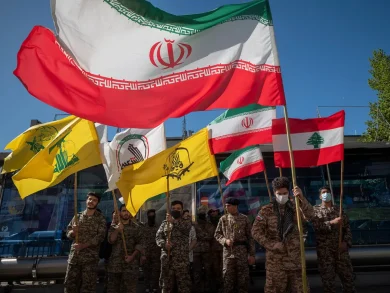The Islamic Revolutionary Guard Corps (IRGC) has evolved into a formidable cyber power, leveraging its capabilities to advance Iran’s strategic objectives, target adversaries, and reinforce its geopolitical influence. Through state-sponsored cyberattacks, disinformation campaigns, and espionage operations, the IRGC has made cyberspace a critical front in its global operations. Its cyber activities have implications not only for regional stability but also for international security, economic systems, and democratic institutions.
This analysis explores how the IRGC operates in cyberspace, the methods it employs, and the global risks associated with its growing cyber capabilities.
The IRGC’s Cyber Warfare Goals
The IRGC’s cyber operations serve multiple strategic objectives aligned with Iran’s broader foreign policy:
1. Destabilizing Adversaries:
Targeting critical infrastructure, financial institutions, and government systems in the U.S., Israel, and Gulf States.
2. Expanding Influence:
Supporting proxy groups and spreading disinformation to undermine opposition and sway public opinion.
3. Circumventing Sanctions:
Using cyberattacks and financial crimes to generate revenue and evade economic restrictions.
4. Defending the Regime:
Suppressing dissent by surveilling and targeting activists, journalists, and dissidents.
How the IRGC Operates in Cyberspace
The IRGC employs various tactics and resources to carry out its cyber warfare campaigns:
1. Cyberattacks on Critical Infrastructure
The IRGC targets essential systems in adversarial nations to disrupt operations and sow chaos. High-profile attacks include:
• Saudi Aramco (2012): The Shamoon virus wiped data from 35,000 computers, crippling Saudi Arabia’s oil giant.
• U.S. Water Facility Attack (2021): Attempted disruption of water systems highlights vulnerabilities in public utilities.
2. Espionage and Data Theft
The IRGC uses cyber espionage to gather intelligence on military, political, and economic targets. IRGC-linked groups like APT33 (Elfin) and APT35 (Charming Kitten) have conducted numerous campaigns against governments and corporations.
3. Disinformation Campaigns
The IRGC spreads propaganda and false narratives to manipulate public opinion, interfere in elections, and exacerbate societal divisions. Examples include fake social media accounts and websites designed to discredit adversarial governments.
4. Financial Cybercrimes
To evade sanctions, the IRGC engages in ransomware attacks, cryptocurrency theft, and illicit financial transactions. These activities provide significant funding for its operations.
5. Proxy Cyber Groups
The IRGC often operates through proxy groups, allowing plausible deniability while expanding its reach. These groups target regional and global adversaries under IRGC direction.
Case Studies of IRGC Cyber Operations
1. Operation Ababil (2012–2013)
In retaliation for sanctions, IRGC-linked hackers launched Distributed Denial-of-Service (DDoS) attacks against major U.S. banks, disrupting online banking services and causing financial losses.
2. Israeli Water Infrastructure Attack (2020)
An attempted cyberattack on Israel’s water supply sought to disrupt critical infrastructure and potentially harm civilians. Israel responded with counterattacks on Iranian ports.
3. U.S. Presidential Election Interference (2020)
The IRGC orchestrated email campaigns to intimidate voters and spread misinformation during the U.S. election, aiming to undermine democratic processes.
4. Espionage Against European Universities
IRGC-affiliated groups targeted academic institutions to steal research related to advanced technologies and military applications.
Global Implications of IRGC Cyber Warfare
The IRGC’s cyber operations have significant consequences for international security and governance:
1. Threats to Critical Infrastructure
Cyberattacks on infrastructure such as power grids, water systems, and healthcare facilities can disrupt essential services and endanger lives.
2. Undermining Democracy
Disinformation campaigns erode trust in democratic institutions, interfere in elections, and exacerbate political polarization.
3. Financial and Economic Damage
Ransomware attacks and intellectual property theft destabilize global financial systems and hurt legitimate businesses.
4. Escalation of Cyber Conflicts
The IRGC’s activities contribute to an arms race in cyberspace, prompting nations to develop offensive and defensive cyber capabilities.
Countering the IRGC’s Cyber Threat
Addressing the IRGC’s cyber activities requires coordinated international efforts and robust cybersecurity measures:
1. Strengthening Cybersecurity
Governments and corporations must invest in advanced technologies and training to defend against cyberattacks.
2. Sanctions on Cyber Actors
Imposing targeted sanctions on IRGC-linked individuals and entities involved in cyber operations can limit their resources and capabilities.
3. International Collaboration
Sharing intelligence and coordinating responses to cyber threats can enhance collective security and disrupt IRGC operations.
4. Offensive Cyber Strategies
Proactive measures, such as counterattacks and infiltration of IRGC networks, can deter future cyber aggression.
Conclusion
The IRGC’s role in global cyber warfare poses a unique and growing threat to international security. By targeting critical infrastructure, spreading disinformation, and funding its operations through cybercrime, the IRGC has made cyberspace a key battleground for advancing its geopolitical goals. Confronting this threat requires unified global action, strengthened defenses, and accountability for the IRGC’s cyber activities. Failure to act will only embolden the IRGC and escalate the risks to global stability.
Join Our Newsletter!
Stay informed with the latest updates, news, and ways to take action in the fight for justice and global security. Sign up now to get updates delivered straight to your inbox!





